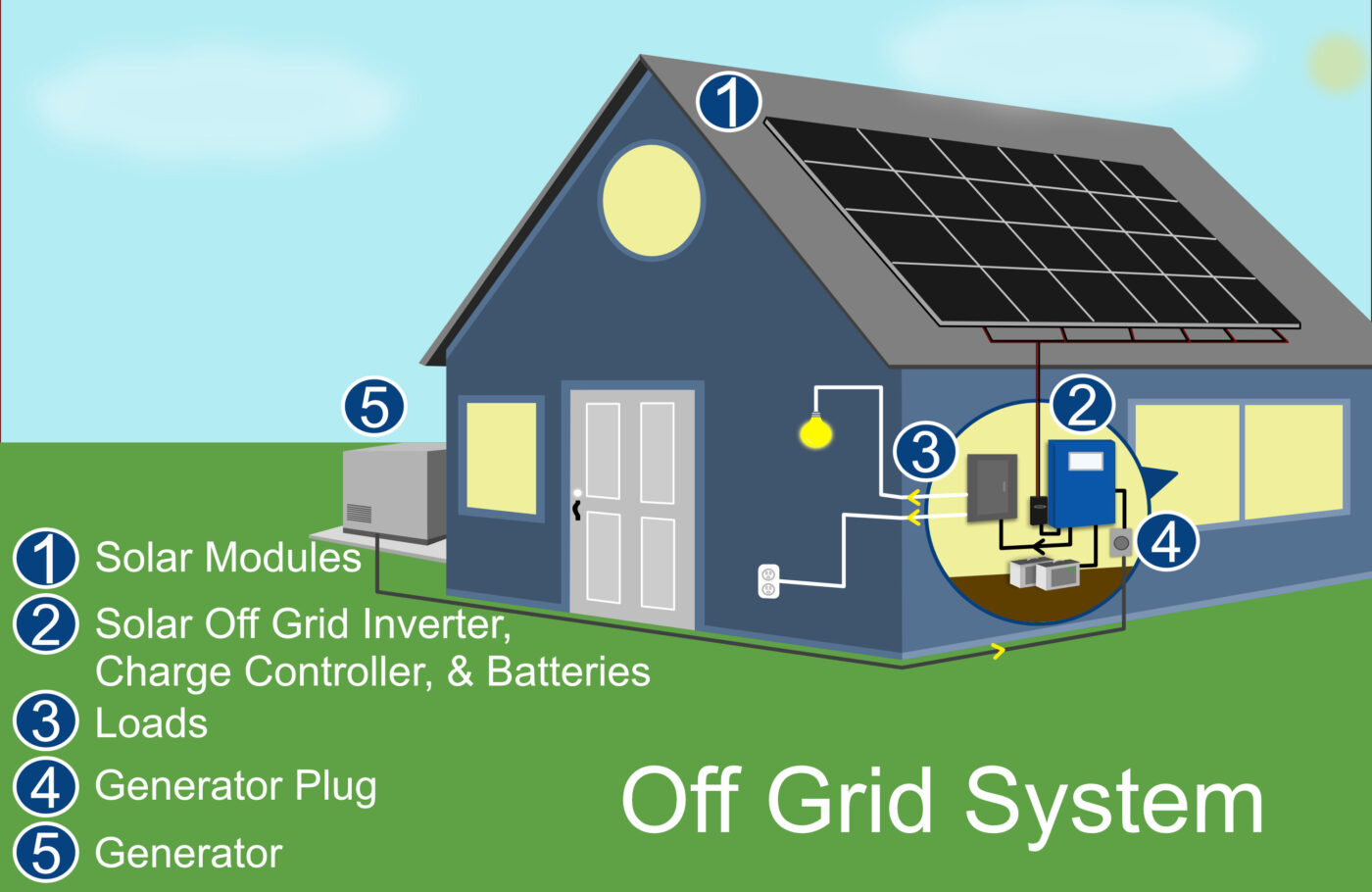Off Grid Solar FAQ
Off Grid Power FAQ
Click below for answers to commonly asked questions about Off Grid Solar.
Fundamentally, off-grid systems are used to provide power for out-of-the-way and remote locations that are not already serviced by the grid. It is an independent power generation system that is usually accompanied by an energy storage system.
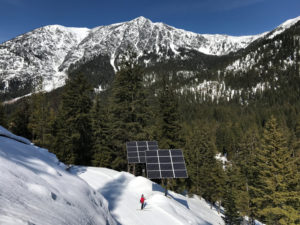 Off-grid power needs are usually pretty easy to spot. These are homes, cabins, or building lots where the utility grid is too far to bring in – either because the cost is too high or because there is no practical way for the utility to run power to the location. These locations are the perfect place for off-grid power systems.
Off-grid power needs are usually pretty easy to spot. These are homes, cabins, or building lots where the utility grid is too far to bring in – either because the cost is too high or because there is no practical way for the utility to run power to the location. These locations are the perfect place for off-grid power systems.
 It depends! To compare your options, you will first need to contact your local utility provider to get their quote for running power to the property. Pricing for off-grid power systems can vary greatly because each site and power user is different. The best way to know what your off grid system will cost is to request a free consultation or fill out our project information form – we are happy to provide free quotes. We also have some prepackaged, predesigned off grid DIY kits to give you a ballpark idea of pricing. Generally, a cost of $20,000+ to run the utility lines in, or if you have minimal power need at the site, is the point where you will start seeing an off-grid power system as a viable option.
It depends! To compare your options, you will first need to contact your local utility provider to get their quote for running power to the property. Pricing for off-grid power systems can vary greatly because each site and power user is different. The best way to know what your off grid system will cost is to request a free consultation or fill out our project information form – we are happy to provide free quotes. We also have some prepackaged, predesigned off grid DIY kits to give you a ballpark idea of pricing. Generally, a cost of $20,000+ to run the utility lines in, or if you have minimal power need at the site, is the point where you will start seeing an off-grid power system as a viable option.
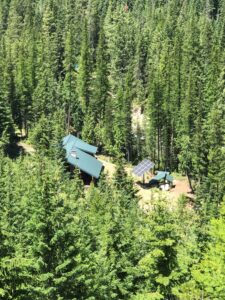 This is a question we get a lot. An off grid solar power system is the perfect solution for sites where you are unable to access utility power either at all or cost effectively.
This is a question we get a lot. An off grid solar power system is the perfect solution for sites where you are unable to access utility power either at all or cost effectively.
For those who are already connected to utilities, Fire Mountain Solar never recommends disconnecting from the grid to implement an off-grid system – in some areas of the country it can be illegal, and in almost all cases it is impractical. Not only is there the upfront cost, but the system will need continued maintenance over its lifetime. Off grid systems also require planned equipment replacements that often will outweigh any “savings” seen by removing your electric bill. These systems are meant to get power to remote locations, not as a way to save money by removing a bill. Living off the grid will also require some lifestyle changes in order to reduce and change your power consumption. For some people this means completely reorienting how they think about their power use – something they might not want to do since they already have access to grid power.
READ: Disconnecting From Your Utility: From on the Grid to Living Off the Grid
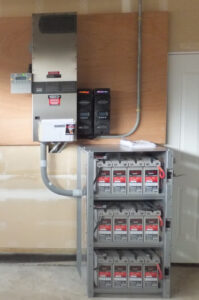 A complete off-grid power system is made up of several components that provide the power you need to run your stuff (your loads). The heart of the system is your energy storage, aka, your batteries. Your batteries are like the fuel tank in your car – they hold the fuel you need to use when you want to run your electrical loads. Another key component of an off-grid system is the inverter, which provides the instantaneous power you need. It is similar to the horsepower of your car’s engine. As long as you have fuel (stored energy), you have power. How long the fuel will last will depend on how “fast” you are going (how high your loads are and how long you run them). The more power you use, the faster you drain your batteries. The final key component is your gas station: your solar, generator, wind, hydro – there to refill your tank (charge your batteries).
A complete off-grid power system is made up of several components that provide the power you need to run your stuff (your loads). The heart of the system is your energy storage, aka, your batteries. Your batteries are like the fuel tank in your car – they hold the fuel you need to use when you want to run your electrical loads. Another key component of an off-grid system is the inverter, which provides the instantaneous power you need. It is similar to the horsepower of your car’s engine. As long as you have fuel (stored energy), you have power. How long the fuel will last will depend on how “fast” you are going (how high your loads are and how long you run them). The more power you use, the faster you drain your batteries. The final key component is your gas station: your solar, generator, wind, hydro – there to refill your tank (charge your batteries).
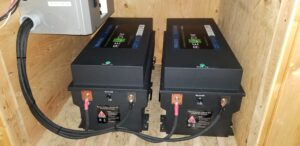 They are highly recommended for most applications, but batteries are required for all solar-powered off-grid systems. It is possible to run a generator exclusively for nighttime power use, however, this presents a few problems. First, you will have to listen to your generator whenever you want to use power when your renewable system is not producing enough for your needs (and some areas have noise pollution regulations). Second, you will have the cost of the maintenance: regular oil changes, spark plugs, air filters, and more, plus your fuel costs. Lastly, most generators are not meant to be ran 24 hours a day, 7 days a week, and won’t be warranted for that type of operation. They are excellent for occasional support but cannot compare to even the most basic battery technology that is on the market today for on-going power supply. Financially, it almost always makes more sense in the long term to have batteries as a part of your overall primary power system.
They are highly recommended for most applications, but batteries are required for all solar-powered off-grid systems. It is possible to run a generator exclusively for nighttime power use, however, this presents a few problems. First, you will have to listen to your generator whenever you want to use power when your renewable system is not producing enough for your needs (and some areas have noise pollution regulations). Second, you will have the cost of the maintenance: regular oil changes, spark plugs, air filters, and more, plus your fuel costs. Lastly, most generators are not meant to be ran 24 hours a day, 7 days a week, and won’t be warranted for that type of operation. They are excellent for occasional support but cannot compare to even the most basic battery technology that is on the market today for on-going power supply. Financially, it almost always makes more sense in the long term to have batteries as a part of your overall primary power system.
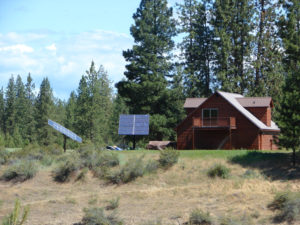 No, but it is the most common and (usually) cost-effective way of generating power away from the grid. The cost per solar panel has dropped as more and more companies start producing high-quality, warrantied products on a large scale. Other options include wind power and, in some areas, micro hydropower. We do have several customers who live amongst trees and therefore solar is not possible. In those cases, they rely on an appropriately sized generator to recharge their batteries, and an appropriately sized battery bank to fulfil their daily needs.
No, but it is the most common and (usually) cost-effective way of generating power away from the grid. The cost per solar panel has dropped as more and more companies start producing high-quality, warrantied products on a large scale. Other options include wind power and, in some areas, micro hydropower. We do have several customers who live amongst trees and therefore solar is not possible. In those cases, they rely on an appropriately sized generator to recharge their batteries, and an appropriately sized battery bank to fulfil their daily needs.
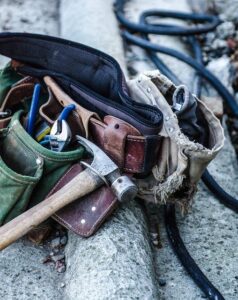 Some. As with all equipment and technology, your off-grid system will require monitoring at the bare minimum. Depending on your budget and application, there are products available that will minimize the amount of maintenance and monitoring that is required. Talk to us about how much and what kinds of maintenance you are comfortable with, and we can make recommendations about which products and combinations will be most suitable for your needs and goals.
Some. As with all equipment and technology, your off-grid system will require monitoring at the bare minimum. Depending on your budget and application, there are products available that will minimize the amount of maintenance and monitoring that is required. Talk to us about how much and what kinds of maintenance you are comfortable with, and we can make recommendations about which products and combinations will be most suitable for your needs and goals.
With the proper support team, yes! While the design of an off-grid system takes a lot of experience to get right, a strong DIY-focused solar team like Fire Mountain Solar can help you successfully install your own off-grid solar system.
SHOP: FMS DIY Solar Kits
 Definitely! A wide variety of our clients choose to power their family homes, vacation cabins, and any number of other types of out-of-the-way properties with off-grid solar and renewable energy systems. Check out our Six Things to Know Before Going Off Grid if you want to learn more about what life off the grid is like!
Definitely! A wide variety of our clients choose to power their family homes, vacation cabins, and any number of other types of out-of-the-way properties with off-grid solar and renewable energy systems. Check out our Six Things to Know Before Going Off Grid if you want to learn more about what life off the grid is like!
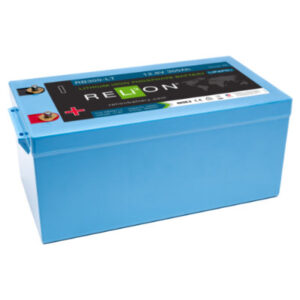 With recent advancements in the industry, yes, now you can! LiFePO4 (Lithium Iron Phosphate) battery technology is a great solution for off-grid use, allowing you to start small and add the same exact battery model later if your electrical usage increases, or as budget allows. This is not the case with FLA or AGM battery chemistries, where the age of the oldest batteries affects the entire bank of batteries.
With recent advancements in the industry, yes, now you can! LiFePO4 (Lithium Iron Phosphate) battery technology is a great solution for off-grid use, allowing you to start small and add the same exact battery model later if your electrical usage increases, or as budget allows. This is not the case with FLA or AGM battery chemistries, where the age of the oldest batteries affects the entire bank of batteries.
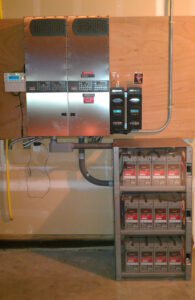 As long as you prepare for this initially, you can easily add more inverters later. If you don’t anticipate for more inverters initially, it can still be done, but it is more difficult and most likely more expensive.
As long as you prepare for this initially, you can easily add more inverters later. If you don’t anticipate for more inverters initially, it can still be done, but it is more difficult and most likely more expensive.
Absolutely! As long as you have room for more panels, you can easily add them to your existing off grid power system.
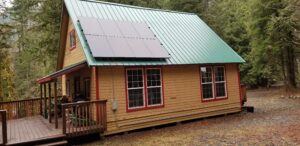 A small off-grid solar system is likely your best option. Give us a call and we can discuss your property and needs. We are always happy to help.
A small off-grid solar system is likely your best option. Give us a call and we can discuss your property and needs. We are always happy to help.
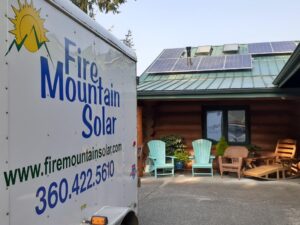 No! Off-grid solar is a fantastic resource for areas where it is impractical or financially impossible to run utility lines, but it isn’t the only form of solar, or even the most common. If you are already serviced by a utility, check out our grid-tie solar and solar with battery backup (grid-hybrid solar) pages!
No! Off-grid solar is a fantastic resource for areas where it is impractical or financially impossible to run utility lines, but it isn’t the only form of solar, or even the most common. If you are already serviced by a utility, check out our grid-tie solar and solar with battery backup (grid-hybrid solar) pages!

